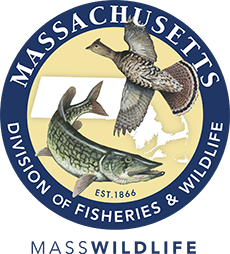- MassWildlife's Natural Heritage & Endangered Species Program
- Division of Fisheries and Wildlife
Media Contact
Media Contact, MassWildlife

Across Massachusetts, spring is the season of movement. Hibernating animals emerge from their winter resting areas in search of food and mates. Turtles are no exception. From mid-May to early July, thousands of turtles throughout Massachusetts travel to new areas to find food and nest. You may see turtles on roadways, in your backyard, or other unexpected locations as they move across the landscape to find resources they need to survive. Even if it’s not apparent to you where they’re headed, turtles have a keen sense of direction and may be on their way to wetlands or open, upland sites such as lawns, gravel pits, or roadsides for nesting. If you find a turtle, do not move it far away.
Protecting adult turtles during this vulnerable time can make a big difference. “Adult turtles can live past 80 years. Young turtles and eggs, on the other hand, have a variety of predators and a low chance of reaching adulthood,” says Dr. Mike Jones, MassWildlife State Herpetologist. "This is why it's especially important to protect older adult turtles from cars, especially during this time of year when turtles are crossing roads more frequently." Losing any adult turtles, particularly adult females, is a serious problem that can lead to the eventual local extinction of a population.
What to do if you see a turtle in or near a road:
- Be safe. Do not risk getting hurt or causing harm to others by unsafely pulling off the road or trying to dodge traffic. If the opportunity to safely move a turtle from the road occurs, move it in the direction it was heading and off the edge of the road. The turtle is trying to get to habitats and resources it needs and knows. Do not take turtles home or move them to a "better” location; turtles should not be moved more than 100 yards from where they are found.
- Handle with care.Most turtles should be grasped gently along the shell edge near the mid-point of the body. However, snapping turtles are fast and have very powerful jaws that can inflict a bad bite. A snapping turtle can reach your hands if you lift it by the sides of its shell. If you must move a snapping turtle, use a broom to coax it into a plastic tub, into a box, or on to a car mat. Never lift a snapping turtle only by the tail; this can injure their spine. Make sure thoroughly wash your hands after handling any wildlife, including turtles.
- Slow down, be observant. Watch for turtles on roadways bordered by wetlands on both sides. These areas are commonly used as crossing points. If you see one turtle crossing, there's a chance that others will be crossing soon as well.
- Report busy crossing locations. Let MassWildlife know if you see multiple turtles crossing the road or if you see multiple turtles that have been hit by cars. Email location information to natural.heritage@mass.gov. You can also contact your town Conservation Commission or local conservation groups and support measures to help turtles. Signage, barrier fencing, or seasonal speed bumps can help reduce roadkill.
Spread the word and help protect our native turtles. In addition to five species of sea turtles that frequent our coastal areas, Massachusetts is home to ten native species of terrestrial and aquatic turtles. Six of the 10 species are protected under the Massachusetts Endangered Species Act. Learn more in our native turtles.
Injured turtles
Please leave turtles with minor injuries, such as a hurt foot or damage to the outer rim of a shell, exactly where you find them. They are resilient, and they will most likely heal on their own. For major injuries, such as a large open wound, please contact a wildlife rehabilitator who specializes in treating turtles.

